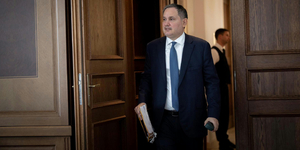Istvan Tarlos, mayor of the Budapest district of Obuda-Bekasmegyer recently put down an MDF local councillor by saying jokily: "Don't be clever or I'll knock your glasses off and stamp on them." The comment, which Tarlos claims he said at the end of a long, tiring day at work, and which recordings suggest was not said in the most threatening of fashions, motivated the Free Democrats to set up a Best of Tarlos forum on the party's home page.
But the Free Democrats' move may prove to be an own goal. Last spring, ridiculing Istvan Mikola, Fidesz's candidate for deputy PM, worked magic, but it is not clear that the tactic will be as successful this time. While Free Democrat supporters will certainly be amused by a list of Tarlos's best stumbles, the tactic may turn out to be free advertising for Tarlos, who is fighting desperately to become a more widely known public figure.
While some awkward remarks can be revealing, experience since the regime change and political legend proves that there is no such thing as bad publicity. Jozsef Torgyan, who later became leader of the Smallholders' Party, became famous precisely because of the frequency and vehemence of his gaffs at the beginning of the 1990s. By spring 1992, only Arpad Goncz, the President of the Republic, and Jozsef Antall, the Prime Minister, were better-known than he. A typical gaff reveals something that the speaker wanted to conceal.
In 2001, Ibolya David, the president of the MDF, said as Minister of Justice that she "did not understand football." The minister was responding to a television interview question about the sale of Ferencvaros Football Club. When the far-right Hungarian Truth and Life Party reacted to the story by saying that "the MTK [football club] which follows the dictates of the powerful Jewish middle class is going to privatise the national Ferencvaros Football Club," David was forced to do some explaining. As she wrote subsequently in the daily Nepszabadsag, she was just commenting on the event and she condemned all forms of anti-semitism.
Often, even context will not show whether a gaff was intentional or not. It also takes a degree of ill-fortune for a politician's gaff to be picked up by the media. This was the case in 2004, when the Socialist MP Janos Zuschlag gave a speech in front of the House of Terror Museum. At an event organised to protest against the so-called "new Arrow Cross", Zuschlag told a joke, and was forced to resign for talking about victims for whom "things were no longer cold."
HirTv clearly makes a point of following up on gaffs. It was this rolling news channel which brought Zuschlag's comments to public attention. Most recently, they caused Budapest mayor Gabor Demszky a few difficult moments when they released a recording on which he told a voter asking for his help that he would deal with a public transport fine if the voter gave him the relevant papers. The mayor later said he had planned nothing underhand: he had intended to pay the fine out of his own money.
Investigative journalists from Index revealed that when the Socialists were preparing for the 2004 European elections, Jozsef Tobias, the party's manager, told his campaign team: "Let's not be shy about the ways in which we get our message across to voters. There's no prize for fair play in this match." Viktor Orban said something similar in the run-up to the most recent elections. Talking to a group of party activists, he said they should break the legally mandated period of campaign silence in order to bring Fidesz voters out to the polls. He
said: "The lawyers will deal with it later." Another Orban gaff was uncovered by the journalist Attila Rajnai. While prime minister, he is said to have told partners in a vineyard venture owned by his wife: "We shouldn't get as much [in subsidies] as we ask for. We shouldn't get the most."
Laszlo Kover, the deputy president of Fidesz, has also been forced to explain away comments in the past. Kover likes to pepper his speeches with vitriol, and sometimes he goes over the top - such as when he said people who were sceptical about Orban's suggestion that Hungary should host the Olympics that they should "go hang themselves." He also once told Ibolya David, a woman, that she should look herself in the eye and consult her conscience "while standing in front of the shaving mirror." Ferenc Gyurcsany is also famous for sticking his foot in his mouth.
One commentator said that Gyurcsany had an almost pathological ability to let his thoughts get ahead of his speech, leading to his endless gaffs. One of the first was his comment that "people with an ageing wife deserve a younger one." A diplomatic row followed when he said, jovially, at a party celebrating the Socialist Party's 15th birthday that the Hungarian football team had played with "death-defying bravery against the Arab [Saudi] terrorists."
Gyurcsany has scored a few own goals in parliament. Last year he told Orban to "shut his mouth." Poetic licence brings its own problems, as when his said that in Hungary, "things are stable and people are doing well," or when he spoke to the National Interest Reconciliation Council about upcoming reforms: "Don't be afraid, it won't hurt." This last one was so bad that Fidesz has chosen it as a poster slogan for its local election campaign.
JÁNOS DOBSZAY














